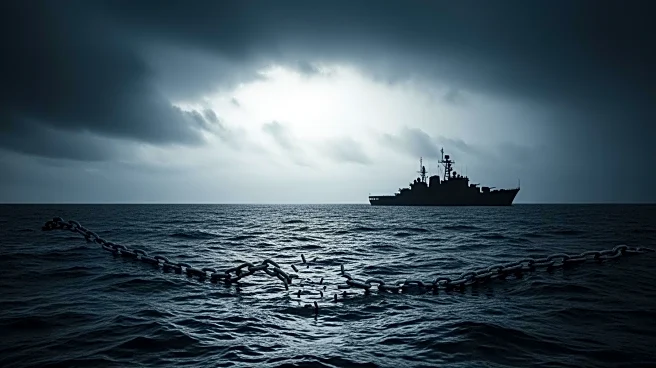What's Happening?
A recent investigation by The Associated Press has shed light on U.S. military strikes targeting alleged drug-smuggling boats off the northeastern coast of Venezuela. The report, led by journalist Regina Garcia Cano, reveals that the men killed in these
operations were not high-profile narco-terrorists or cartel leaders, as previously claimed by the Trump administration. Instead, they were mostly first-time or second-time crew members, including a fisherman, a bus driver, a former military cadet, and a local crime boss. The investigation involved interviews with residents and relatives in Venezuelan villages, who expressed fear of government reprisals for speaking out. The U.S. and Venezuelan governments have provided little information about the deceased, contributing to the uncertainty and fear among the local population.
Why It's Important?
The investigation highlights significant discrepancies between the U.S. government's narrative and the realities on the ground, raising questions about the justification and impact of military operations in foreign territories. The strikes have not only resulted in civilian casualties but have also exacerbated tensions between the U.S. and Venezuela, a country already facing political and economic turmoil under President Nicolás Maduro. The lack of transparency and accountability in these operations could lead to further diplomatic strains and undermine efforts to combat drug trafficking effectively. Additionally, the fear and repression experienced by Venezuelan citizens underscore the broader human rights concerns in the region.
What's Next?
The investigation may prompt calls for greater scrutiny and accountability regarding U.S. military operations abroad, particularly those involving civilian casualties. Human rights organizations and international bodies could pressure both the U.S. and Venezuelan governments to provide more information and ensure justice for the affected families. The situation may also influence future U.S. foreign policy decisions, especially in regions with complex political dynamics. As the story gains attention, it could lead to diplomatic discussions aimed at addressing the underlying issues of drug trafficking and regional security.
Beyond the Headlines
The investigation reveals deeper ethical and legal implications surrounding military interventions and their impact on civilian populations. It raises questions about the balance between national security interests and human rights, as well as the role of media in uncovering truths in conflict zones. The story also highlights the cultural and emotional toll on communities unable to mourn their dead due to government restrictions, emphasizing the need for international support and advocacy for human rights in Venezuela.















